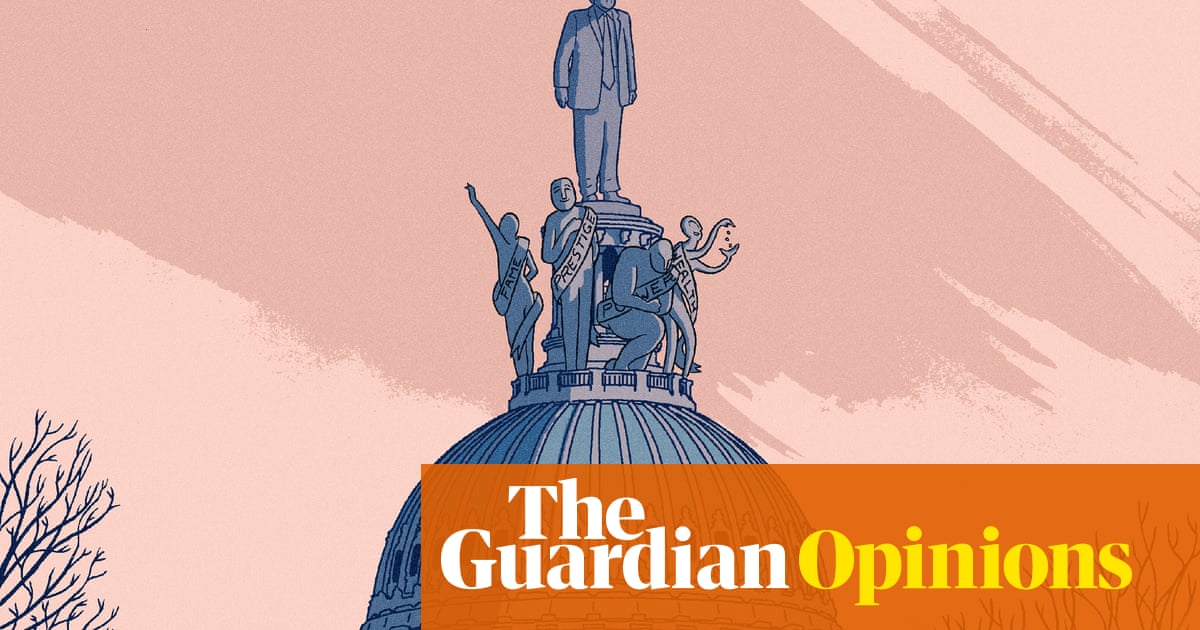US culture is an incubator of ‘extrinsic values’. Nobody embodies them like the Republican frontrunner
Many explanations are proposed for the continued rise of Donald Trump, and the steadfastness of his support, even as the outrages and criminal charges pile up. Some of these explanations are powerful. But there is one I have seen mentioned nowhere, which could, I believe, be the most important: Trump is king of the extrinsics.
Some psychologists believe our values tend to cluster around certain poles, described as “intrinsic” and “extrinsic”. People with a strong set of intrinsic values are inclined towards empathy, intimacy and self-acceptance. They tend to be open to challenge and change, interested in universal rights and equality, and protective of other people and the living world.
People at the extrinsic end of the spectrum are more attracted to prestige, status, image, fame, power and wealth. They are strongly motivated by the prospect of individual reward and praise. They are more likely to objectify and exploit other people, to behave rudely and aggressively and to dismiss social and environmental impacts. They have little interest in cooperation or community. People with a strong set of extrinsic values are more likely to suffer from frustration, dissatisfaction, stress, anxiety, anger and compulsive behaviour.



I agree with all of this, and it is well articulated.
But what is your explanation for -why- things are the way they are? -Why- are Democrats so ineffective and blind? You’re (seemingly) just a random person on the internet, yet you can see all of this; Democrats have the best paid consultants and advisors and pollsters and they still don’t see it. How can that be?
You openly say this:
Yet also pushback against this:
Why would we “move on” from a very plausible explanation of reality? Do you disagree with this argument, or are you just dismissing it because you find it to be too abrasive to fully come to terms with? Don’t we need to name and describe the problem, and encourage others to do the same, if we have any hope of solving our problems?
You, correctly, notice that Democrats are terrible at acknowledging the legitimate problems that normal Americans face, particularly those in rural areas. But aren’t you doing the same thing by refusing to even acknowledge the reasons for why the Democrats are so ineffective? We can’t ignore or look past our problems and expect them to be solved - and I only have one life, so I’m more concerned about systemic solutions than I am about protecting the feelings of our Democratic elites
Politics have become identity for a lot of people and for the people who have not chosen this road it’s very difficult to engage. You no longer have an abundance of open dialogue anymore. I can’t remember the last time i even tried to talk about social issues with people without hearing some bullshit talking point from Facebook/CNN/Fox or whatever that has ended the conversation before it’s really begun for them.
deleted by creator
Why do you think blockchain would be immune from regulatory capture? Hasn’t the general story of crypto-adjacent items thus far been one of immense gains for the few and immense losses for the many?
And isn’t the historical rule of statistics/maths such that it is clear that these “objective” measures are actually very easy for the powerful to manipulate for their own ends? Lying with statistics is very easy to do, for example.
What prevents Peter Thiel-types from framing and shaping the code that governs whatever blockchain-connected system emerges? And what prevents Cambridge Analytica type entities from manipulating public opinion such that only the “right” kind (the evil kind) of blockchain is the one that “spontaneously” becomes the natural choice of the grassroots?
The error of the Leninists was, among other things, thinking that because they had an exceptional understanding of how historical economic structures have been controlled and shaped by the powerful that they, therefore, would themselves be able to use this knowledge to create a new type of state that was exempt from these failings. That obviously did not occur. And I fear that the STEM types who understand blockchain, and who generally have sincerely good intentions, will similarly be blindsided by the realities and insurmountable corrosive strength of global capital
Which doesn’t mean that no better world is possible - it is. It just means that I don’t think we can trust a computer code to impartially distribute a truly moral justice throughout the country/world. Because the oligarchs will seize and corrode such a code and subvert it to serve their own ends; it doesn’t matter how isolated and untouchable such a blockchain is - if it can be made then it can be remade. And I don’t know how you stop them from doing that given that their wealth gives them practically unlimited power